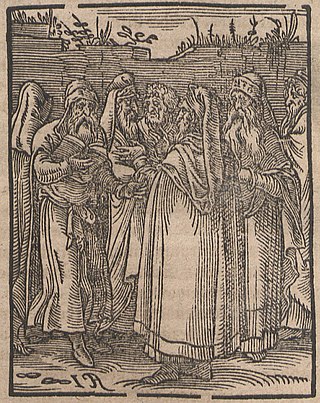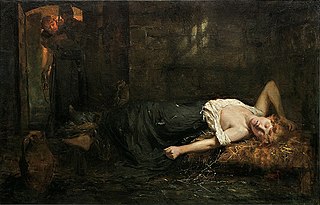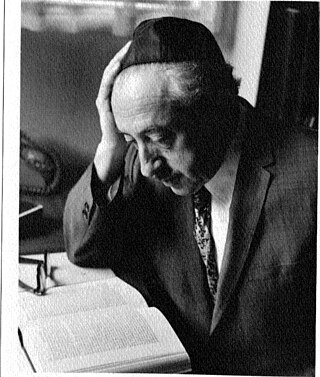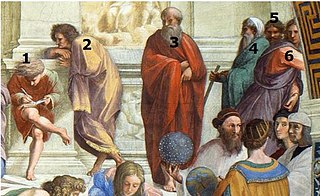See also
![]() This article incorporates text from a publication now in the public domain : Singer, Isidore; et al., eds. (1901–1906). "Skeptic". The Jewish Encyclopedia . New York: Funk & Wagnalls.
This article incorporates text from a publication now in the public domain : Singer, Isidore; et al., eds. (1901–1906). "Skeptic". The Jewish Encyclopedia . New York: Funk & Wagnalls.
Jewish skeptics are Jews (historically, Jewish philosophers) who have held skeptical views on matters of the Jewish religion. In general, these skeptical views regard some or all of the "principles of faith," whatever these may be (see Maimonides, Albo), but historically Jewish skepticism is directed either at (1) the existence of the God of Judaism or (2) the authenticity and veracity of the Torah.
[ citation needed ]
A skeptic in the strongest sense is one who remains in a state of doubt, declaring all positive truth, religious or philosophical, to be unattainable to man. This type of skeptic can scarcely be found in Judaism. However bold the Jewish philosophers of the Middle Ages were in their research or critical in their analytic methods, they never so distrusted human reason as to deny it the power, as the Greek skeptics did, to arrive at any positive knowledge or truth. Seer and sage alike appealed to reason to substantiate and verify the postulates of faith (Isa. 40:26; Job 12:7). The passage "The Lord is a God of knowledge" (I Sam. 2:3) is interpreted by the Rabbis by the remark, "Great is knowledge which leads from God to God" (Ber. 33a).
In a work by Emile Joseph Dillon, entitled The Skeptics of the Old Testament (London, 1895/1973), it has been suggested that the authors of the Book of Job , of Ecclesiastes , and of the Words of Agur , the Son of Jakeh, [1] were skeptics, but the original compositions were so interpolated and remodeled as to make the skeptical points no longer noticeable. All three contain bold arraignments of divine justice and providence. As to the author of Ecclesiastes compare E. H. Plumptre's edition: [2] "He was almost driven back upon the formula of the skepticism of Pyrrho, 'Who knows?'" (p. 49). Heinrich Heine called the book Das Hohelied der Skepsis. [3] Friedrich Delitzsch, in Das Buch Hiob (p. 17), calls Ecclesiastes Das Hohelied des Pessimismus, but he might as well have called it "the Song of Skepticism."
Jewish skepticism was always chiefly concerned with the moral government of the world. The great problem of life, with "its righteous ones suffering woe, and its wicked ones enjoying good fortune," which puzzled the mind of Jeremiah, [4] and Moses also, according to the Rabbis, [5] and which finds striking expression in the Psalms, [6] created skeptics in Talmudic as well as in earlier times. Elisha ben Abuyah [7] became a skeptic as a consequence of seeing a person meet with a fatal accident at the very moment when he was fulfilling the two divine commandments for the observance of which Scripture holds out the promise of a long life. [8]
The rationalistic era of Islam produced skeptics among the Jews of the time of Saadia, such as was Ḥiwi al-Balkhi, whose criticism tended to undermine the belief in revelation. The Emunot ve-Deot was written by Saadia, as he says in the preface, because of the many doubters who were to be convinced of the truth; and Maimonides, in the introduction to his Moreh, states that he wrote that work as a guide for those perplexed by doubt. With all these Jewish thinkers doubt is not a sin, but an error that may reveal the pathway to the higher philosophical truth.
A remarkable type of skeptic was produced by the sixteenth century in Uriel Acosta, who, amidst a life of restless searching after truth, denied the immortality of the soul and the divine revelation. His excommunication by the Amsterdam authorities was inspired by fear of the Christian Church rather than by traditional practice. Another such was Leon of Modena, who, complaining that "the thinker is tortured by doubt, whereas the blind believer enjoys peace of mind, and bliss in the world to come" (see Ari Nohem, quoted by H. Grätz, Gesch. 3d ed., x. 130), arrived through skepticism at a liberal interpretation of traditional Judaism (see S. Stern, Der Kampf des Rabbiners Gegen den Talmud im xviii. Jahrhundert, 1902).
Strictly speaking, Jewish engagement with atheism (i.e. disbelief in God’s existence) can scarcely be found before the modern period, unless one expands the definition to include biblical condemnations of practical atheism (i.e. non-observance), and Jewish attraction to ancient world beliefs that might be said to have challenged the idea of Jewish monotheism. Of course, there were also debates about the existence of others’ gods (e.g. disbelief in the official gods of the Classical world, or disbelief in the triune God of Christianity), which generated condemnations of Jewish atheism. Likewise, serious Jewish encounters with the Greek sources of philosophical scepticism (i.e. disbelief that a true knowledge of things is attainable by humans) are rare until thinkers like Simone Luzzatto in the early-modern period, although a weaker definition of scepticism (i.e. doubts about authority and suspension of judgment in approaching sources of knowledge, whether secular or sacred) might be said to have a Jewish legacy from the time of the first-century philosopher Philo onwards, including tantalizing figures such as Elisha Ben Abuyah in the Talmud, and especially in the form of medieval fideism (i.e. the idea that faith is independent of reason). These shallow intellectual eddies of pre-modern doubt about God’s existence and nature, and about the veracity of human knowledge derived through tradition, became stronger currents with the seventeenth-century philosopher Spinoza, who was regarded by many as atheistic, and with the eighteenth-century Jewish Enlightenment or Haskalah . From that time suspicion of revealed religion began its ascendency and the ties of religion loosened so that less ambiguously sceptical expressions within Jewry began to be heard. However it was the nineteenth-century culture of scientific progress, and the attendant popular interest in ostensibly naturalistic and materialistic writings in the 1870s (especially those of Marx, Nietzsche and Freud in Germany; Spencer, Huxley, and Russell in England; and Ingersoll in the US), that provoked a sea change in popular Jewish thought. Increasingly, the God of revelational religion simply appeared too naïve to countenance. It was from that time that a good number of Jewish thinkers felt obliged to establish oppositional, alternative, synthetic, or complementary models explicitly relating Judaism to the challenges of such atheistic and materialistic philosophies. Significant scholarship on the subject exists – such as the studies of Giuseppe Veltri and David Ruderman in the early-modern period [1] – but that scholarship tends to be localized and fragmented in nature and we still await a general survey of these related topic.[2]
[1] Among Ruderman’s most important contributions is David Ruderman, Jewish Thought and Scientific Discovery in Early Modern Europe (New Haven, Conn.: Yale University Press, 1995). Veltri currently directs a research programme on Jewish Scepticism at the University of Hamburg and among his most relevant publications is Giuseppe Veltri, “Principles of Jewish Skeptical Thought. The Case of Judah Moscato and Simone Luzzatto,” in Rabbi Judah Moscato and the Jewish Intellectual World of Mantua in 16th-17th Centuries, ed. Giuseppe Veltri and Gianfranco Miletto (Boston: Brill, 2012). Together they co-edited David Ruderman and Giuseppe Veltri, eds., Cultural Intermediaries: Jewish Intellectuals in Early Modern Italy (Philadelphia University of Pennsylvania Press, 2004).
[2] Historically speaking, the topics have not tended to feature in reference works. There is, however, a short entry for ‘atheism’ in the Jewish Encyclopedia, its inclusion being best explained by the idiosyncratic philosophical and interfaith interests of the authors, the Reform rabbis Emil G. Hirsch and Kaufmann Kohler. Emil G. Hirsch and Kaufmann Kohler, “Atheism,” in Jewish Encyclopedia, ed. Isadore Singer (New York: Funk and Wagnalls Company, 1901-1906). And see also Alvin J. Reines, “Skeptics and Skepticism,” in Encyclopaedia Judaica (Second Edition), ed. Michael Berenbaum and Fred Skolnik (Jerusalem: Keter Publishing House, 2007). A more recent collection of studies is Daniel Langton, ed, Atheism, Scepticism and Challenges to Monotheism (Gorgias Press, 2015).
Skepticism on the existence of the God of religion relates either to doubts that any supernatural entity such as God exists, or that the God of the Jews exists as described by the Jewish tradition (not, however, ruling out completely the existence of supernatural entities).
Skeptics on the authenticity of the Torah are individuals who hold a position rejecting the divine authorship of some or all of the Torah.
![]() This article incorporates text from a publication now in the public domain : Singer, Isidore; et al., eds. (1901–1906). "Skeptic". The Jewish Encyclopedia . New York: Funk & Wagnalls.
This article incorporates text from a publication now in the public domain : Singer, Isidore; et al., eds. (1901–1906). "Skeptic". The Jewish Encyclopedia . New York: Funk & Wagnalls.

Baruch (de) Spinoza was a Dutch philosopher of Portuguese-Jewish origin, born in Amsterdam and mostly known under the Latinized pen name Benedictus de Spinoza. One of the foremost and seminal thinkers of the Enlightenment, modern biblical criticism, and 17th-century Rationalism, including modern conceptions of the self and the universe, he came to be considered "one of the most important philosophers—and certainly the most radical—of the early modern period". Inspired by Stoicism, Jewish Rationalism, Machiavelli, Hobbes, Descartes, and a variety of heterodox religious thinkers of his day, Spinoza became a leading philosophical figure of the Dutch Golden Age.

Kabbalah is an esoteric method, discipline and school of thought in Jewish mysticism. A traditional Kabbalist is called a Mekubbal. The definition of Kabbalah varies according to the tradition and aims of those following it, from its origin in medieval Judaism to its later adaptations in Western esotericism. Jewish Kabbalah is a set of esoteric teachings meant to explain the relationship between the unchanging, eternal God—the mysterious Ein Sof —and the mortal, finite universe. It forms the foundation of mystical religious interpretations within Judaism.

Skepticism, also spelled scepticism, is a questioning attitude or doubt toward knowledge claims that are seen as mere belief or dogma. For example, if a person is skeptical about claims made by their government about an ongoing war then the person doubts that these claims are accurate. In such cases, skeptics normally recommend not disbelief but suspension of belief, i.e. maintaining a neutral attitude that neither affirms nor denies the claim. This attitude is often motivated by the impression that the available evidence is insufficient to support the claim. Formally, skepticism is a topic of interest in philosophy, particularly epistemology. More informally, skepticism as an expression of questioning or doubt can be applied to any topic, such as politics, religion, or pseudoscience. It is often applied within restricted domains, such as morality, atheism, or the supernatural. Some theorists distinguish "good" or moderate skepticism, which seeks strong evidence before accepting a position, from "bad" or radical skepticism, which wants to suspend judgment indefinitely.

There is no established formulation of principles of faith that are recognized by all branches of Judaism. Central authority in Judaism is not vested in any one person or group - although the Sanhedrin, the supreme Jewish religious court, would fulfill this role if it were re-established - but rather in Judaism's sacred writings, laws, and traditions.
In philosophy, rationalism is the epistemological view that "regards reason as the chief source and test of knowledge" or "any view appealing to reason as a source of knowledge or justification". More formally, rationalism is defined as a methodology or a theory "in which the criterion of truth is not sensory but intellectual and deductive".

Jewish philosophy includes all philosophy carried out by Jews, or in relation to the religion of Judaism. Until modern Haskalah and Jewish emancipation, Jewish philosophy was preoccupied with attempts to reconcile coherent new ideas into the tradition of Rabbinic Judaism, thus organizing emergent ideas that are not necessarily Jewish into a uniquely Jewish scholastic framework and world-view. With their acceptance into modern society, Jews with secular educations embraced or developed entirely new philosophies to meet the demands of the world in which they now found themselves.
Philosophical skepticism is a family of philosophical views that question the possibility of knowledge. It differs from other forms of skepticism in that it even rejects very plausible knowledge claims that belong to basic common sense. Philosophical skeptics are often classified into two general categories: Those who deny all possibility of knowledge, and those who advocate for the suspension of judgment due to the inadequacy of evidence. This distinction is modeled after the differences between the Academic skeptics and the Pyrrhonian skeptics in ancient Greek philosophy. In the latter sense, skepticism is understood as a way of life that helps the practitioner achieve inner peace. Some types of philosophical skepticism reject all forms of knowledge while others limit this rejection to certain fields, for example, to knowledge about moral doctrines or about the external world. Some theorists criticize philosophical skepticism based on the claim that it is a self-refuting idea since its proponents seem to claim to know that there is no knowledge. Other objections focus on its implausibility and distance from regular life.
The existence of God is a subject of debate in theology, philosophy of religion and popular culture. A wide variety of arguments for and against the existence of God or deities can be categorized as logical, empirical, metaphysical, subjective or scientific. In philosophical terms, the question of the existence of God or deities involves the disciplines of epistemology and ontology and the theory of value.
Jewish atheism refers to the atheism of people who are ethnically and culturally Jewish. Contrary to popular belief, the term "Jewish atheism" is not a contradiction because Jewish identity encompasses not only religious components, but also ethnic and cultural ones. Jewish law's emphasis on descent through the mother means that even religiously conservative Orthodox Jewish authorities would accept an atheist born to a Jewish mother as fully Jewish.
Agnostic theism, agnostotheism, or agnostitheism is the philosophical view that encompasses both theism and agnosticism. An agnostic theist believes in the existence of one or more gods, but regards the basis of this proposition as unknown or inherently unknowable. The agnostic theist may also or alternatively be agnostic regarding the properties of the god or gods that they believe in.
Elisha ben Abuyah was a rabbi and Jewish religious authority born in Jerusalem sometime before 70 CE. After he adopted a worldview considered heretical by his fellow Tannaim, the rabbis of the Talmud refrained from relating teachings in his name and referred to him as the "Other One". In the writings of the Geonim this name appears as "Achor" ("backwards"), because Elisha was considered to have "turned backwards" by embracing heresy.

Eliezer Berkovits, was a rabbi, theologian, and educator in the tradition of Orthodox Judaism.
Religious skepticism is a type of skepticism relating to religion. Religious skeptics question religious authority and are not necessarily anti-religious but skeptical of specific or all religious beliefs and/or practices. Socrates was one of the most prominent and first religious skeptics of whom there are records; he questioned the legitimacy of the beliefs of his time in the existence of the Greek gods. Religious skepticism is not the same as atheism or agnosticism, and some religious skeptics are deists.
Pardes is the subject of a Jewish aggadah ("legend") about four rabbis of the Mishnaic period who visited the pardes, only one of whom succeeded in leaving the pardes unharmed.
Jewish heresy refers to those beliefs which contradict the traditional doctrines of Rabbinic Judaism, including theological beliefs and opinions about the practice of halakha. Jewish tradition contains a range of statements about heretics, including laws for how to deal with them in a communal context, and statements about the divine punishment they are expected to receive.
Atheism, in the broadest sense, is an absence of belief in the existence of deities. Less broadly, atheism is a rejection of the belief that any deities exist. In an even narrower sense, atheism is specifically the position that there are no deities. Atheism is contrasted with theism, which in its most general form is the belief that at least one deity exists.

Atheism, as defined by the entry in Diderot and d'Alembert's Encyclopédie, is "the opinion of those who deny the existence of a God in the world. The simple ignorance of God doesn't constitute atheism. To be charged with the odious title of atheism one must have the notion of God and reject it." In the period of the Enlightenment, avowed and open atheism was made possible by the advance of religious toleration, but was also far from encouraged.
Jewish existentialism is a category of work by Jewish authors dealing with existentialist themes and concepts, and intended to answer theological questions that are important in Judaism. The existential angst of Job is an example from the Hebrew Bible of the existentialist theme. Theodicy and post-Holocaust theology make up a large part of 20th century Jewish existentialism.

Academic skepticism refers to the skeptical period of the Academy dating from around 266 BCE, when Arcesilaus became scholarch, until around 90 BCE, when Antiochus of Ascalon rejected skepticism, although individual philosophers, such as Favorinus and his teacher Plutarch, continued to defend skepticism after this date. Unlike the existing school of skepticism, the Pyrrhonists, they maintained that knowledge of things is impossible. Ideas or notions are never true; nevertheless, there are degrees of plausibility, and hence degrees of belief, which allow one to act. The school was characterized by its attacks on the Stoics, particularly their dogma that convincing impressions led to true knowledge. The most important Academics were Arcesilaus, Carneades, and Philo of Larissa. The most extensive ancient source of information about Academic skepticism is Academica, written by the Academic skeptic philosopher Cicero.

Giuseppe Veltri is professor of Jewish studies and philosophy. Born and graduated in Italy, he obtained his PhD (1991) and habilitation (1996) from the Free University of Berlin. From 1997 to 2014, he was professor of Jewish Studies at the Martin Luther University of Halle-Wittenberg. Since 2014, he is professor of Jewish philosophy and religion at the University of Hamburg and director of the Maimonides Centre for Advanced Studies as well as director of the Academy of World Religions in Hamburg since 2017.